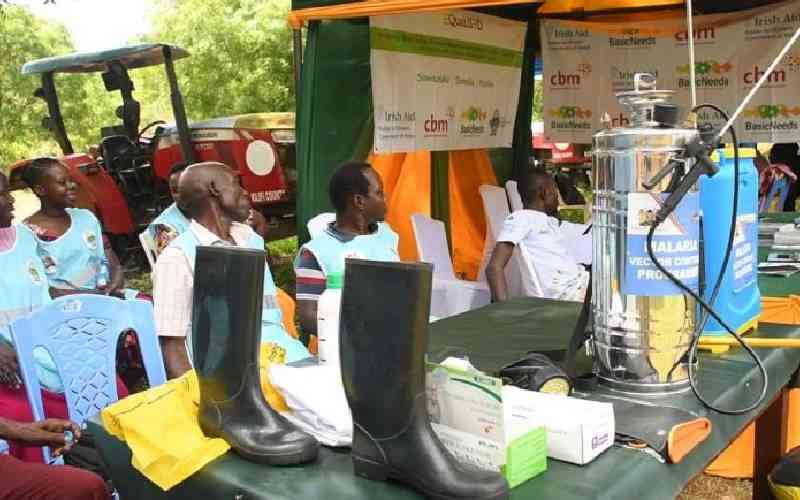
Ask Esther Imaniragena to name her top challenge as she doles out contraceptive advice and supplies at a Rwandan health clinic and the answer comes short and fast - men.
Too many men fail to share the task of family planning, said Imaniragena, one of many birth-control champions who are deploying wily tactics to encourage burden-sharing.
Be it cornering men after their wives give birth or touting a new type of ‘model husband’ in a society that values virility, champions of birth control are trying new ways get men involved.
If they can find them, that is.
“The biggest challenge we have is males do not come,” said Imaniragena, who runs family planning at Rwamagana Health Center in the east of the country.
Indeed, patients strolling the center’s grounds were overwhelmingly female, babies wrapped tightly to their backs and umbrellas in hand to protect against the fierce sun.
Getting men on board has major benefits in developing nations that struggle with booming populations, a trend that puts pressure on limited resources and fuels fresh cycles of poverty, said experts, researchers and policymakers gathered at an international family planning conference this week in Rwanda.
Involving men increases contraceptive use, reducing infant and maternal mortality, as well as the number of unwanted children. All of this frees up women for school or jobs.
Insuring universal access to family planning by 2030 is among the global targets for sustainable development that were adopted in 2015 by the United Nations.
The experts said the key to success is to inform and involve men while preserving women’s autonomy. And while some of the more creative efforts have worked, most schemes are localized and remain small-scale in the face of deep-seated resistance.
WHERE ARE THE MEN?To target men, the Rwamagana clinic has started talking about contraception to husbands when they come to collect their wives after childbirth, Imaniragena said.
It is a start.
“We cannot say that they are involved as we wish, but this is the occasion to find them,” she told visitors at the rural outpost, which was ringed by rice paddies, banana trees and fields of maize.
The results are impressive in terms of numbers reached.
Last week, 15 out of 16 couples went home with newborns as well as family planning methods, according to the clinic, which serves more than 50,000 people.
Most couples opted for hormonal implants or injectable contraception.
It mirrored a campaign launched two years ago in Benin, whose focus was cutting child and maternal deaths, said Gisele Dunia of the University Research Co., a healthcare company working in the west African nation.
Not only did the number of couples using family planning more than double within a year, but men would influence other men to do the same, she said.
MALE SUPPORT “GENERALLY LOW”As of last year, four in 10 women of reproductive age in developing regions were using modern contraceptive methods, with rates ranging from two in 10 in Africa to half in South America and the Caribbean, according to research by the Guttmacher -Lancet Commission, a global group of experts, published this year in The Lancet medical journal.
Modern methods include implants, injections and contraceptive pills.
But men’s support for partners’ sexual and reproductive health and empowerment “is generally low,” said the Lancet.
Such support dips as low as 12 percent in Lesotho and climbs as high as 77 percent in Rwanda, it said.
“Women continue to shoulder the responsibility of contraceptive use,” the Lancet said. “Given that men are often gatekeepers for women’s access to services, involving men during pregnancy, childbirth, and onward (when women want) can potentially increase gender equality and male support.”
“NOT LISTENING”The best way to reach men in Uganda is to empower women, said Reuben Kizito of the Zaam Community Health Development Organisation, which trains women and offers small loans.
“There are so many women out there who believe that the more children you give him, the more he loves, yet they are practically destroying themselves,” he told the Thomson Reuters Foundation.
“So if we are in a position to empower them economically, then they are in a position to stop that habit,” he said.
Men take little responsibility for family planning and think that a woman being pregnant will keep other men away, he said.
“When we have more women economically empowered, then the men will listen,” Kizito said. “Now they are not listening.”
Mali runs a project that trains “model husbands” in local communities, organizers said, while programs in Togo are promoting “positive masculinity” for boys.
In the Philippines, a project called El Hombre - using men-to-men conversations - nearly doubled the rate of contraceptive usage where it was employed, said Jose Augustus Villano of the Commission on Population government agency.
Those rates have dropped significantly since the 2016 election of President Rodrigo Duterte, he said. Duterte’s policies and practices, including a war on drugs that has killed thousands of people, have drawn international condemnation.
 The Standard Group Plc is a multi-media organization with investments in media
platforms spanning newspaper print
operations, television, radio broadcasting, digital and online services. The
Standard Group is recognized as a
leading multi-media house in Kenya with a key influence in matters of national
and international interest.
The Standard Group Plc is a multi-media organization with investments in media
platforms spanning newspaper print
operations, television, radio broadcasting, digital and online services. The
Standard Group is recognized as a
leading multi-media house in Kenya with a key influence in matters of national
and international interest.











